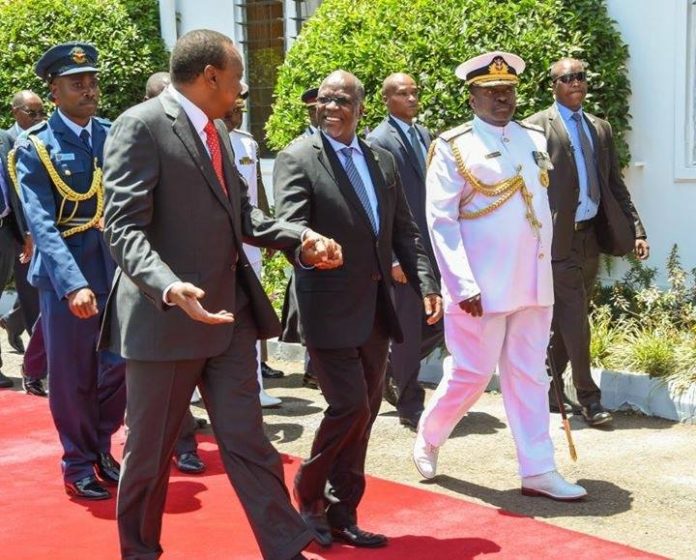Nairobi, September 3 — The recent diplomatic tiff between Kenya and its neighbor, Tanzania is likely to spell doom for the East African Community (EAC) and by extension the highly ambitious African Continental Free Trade Area (AfCFTA) which was entered into force on May 30, 2019, after 22 African countries had deposited ratification instruments.
Experts say the dispute helps put into perspective the enormous challenges awaiting African states in their attempt to eliminate trade barriers under AfCFTA.
While promoting intra-African trade and integrating the African market towards making the continent a strategic player in global trade and policy, an argument has been raised as to why African politicians are not showing leadership for this to succeed.
Closer home, the East African Community, Kenya, Uganda, Rwanda, and Ethiopia have ratified AfCFTA while Tanzania and the EAC’s lone ranger, Burundi are yet to ratify.
The Kenya-Tanzania border trade disputes following Corona fears exposes African political leaders as the weak link in promoting African integration.
“The route cause of the diplomatic row between Kenya and Tanzania lies in the history of how the old EAC split and who was left with what sorts of assets and those undertones still exists. These can be wiped out if our political leaders take an initiative to focus people’s eyes on the current structure,” Waturi Matu, coordinator of the East Africa Federation of Tourism told Ubuntu Times.
When the EAC broke, it was necessary to create some sort of cooperation on how both countries would cooperate because like in tourism, they share an ecosystem and mutual plans, which gave rise to the 1985 bilateral agreement
When the new EAC was created and the East Africa treaty was signed and the common market protocol came into being, Matu says Kenya stopped following the 1985 bilateral agreement to the later.
“Until about July 2013, the sectoral council directed Kenya, Tanzania, and Uganda to meet and iron their issues around free movement of services. Kenya and Uganda were quickly able to agree that the issue that was pending was how to allow foreign vehicles to enter national parks,” says Matu.
As at February last year, both countries agreed at a meeting to go back and implement the bilateral agreement. However, one party had not recognized what impact this would have on the tourism operation, which includes close access to the national parks and attractions such as the airport.
Following fears of COVID-19 cross-border transmission between Kenya and Tanzania, Kenya maintained that long-distance truck drivers must be subjected to COVID-19 test before being allowed entry into Kenya.
This was after Kenya identified Kenya-Tanzania and Kenya-Somalia borders as hotpots for Coronavirus. Tanzania authorities would then swiftly retaliate by restricting movement between the Kenya-Tanzania border by forbidding all automobiles and persons from Kenya.
In July during his tenth State address, President Uhuru Kenyatta said countries not making public their COVID-19 data does not mean they were doing better in handling the pandemic. He asked Kenyans not to take the virus lightly adding that Kenya is a democratic society and must conduct its business in the open.
“The fact that countries don’t report what happens in their countries does not mean they are fine, we are an open society and we have to tell our stories,” he said.
It is a statement that appeared to hit at neighboring Tanzania as it was not making public its COVID-19 cases.
In what is viewed as reciprocation, Tanzanian aviation authority redirected a plane carrying Kenya’s envoy to the late former Tanzanian president Benjamin Mkapa mid-air on grounds that the weather was bad.
In June, Tanzania President John Mugufuli suggested that Tanzania was free of COVID-19 as God had ‘answered their prayers.’
Magufuli’s directive came a few days after he skipped the video-conference between East Africa Community head of states and government on May 12. Present in the virtual meeting were Presidents Kenyatta (Kenya), Museveni (Uganda), Kagame (Rwanda), and Salva Kiir (South Sudan) with Magufuli (Tanzania) and former Burundi’s president the late Pierre Nkurunziza, missing.
According to the EAC, the consultative video conference was meant to assess the development of COVID-19 in the region in a bid to develop a regional approach.
When Tanzanian authorities burned 6,400 poultry allegedly imported illegally and imposed a 25 percent import duty on Kenyan confectionery in 2017 and 2018 respectively, Kenya on the other hand banned Tanzanian tour vans from accessing Maasai Mara National Reserve.
In the latest heightened and deepening row, Tanzania moved swiftly and banned Kenya Airways flights “on a reciprocal basis” after Kenya decided against including Tanzania in a list of countries whose passengers would be permitted to enter Kenya when commercial flights resumed on 1 August.
If successful and fully implemented, AfCFTA will create a single market for its population of about 1.3 billion, perhaps the best for Africans since breaking colonial chains and catapulting Africa into the leagues of China and India in terms of market.

